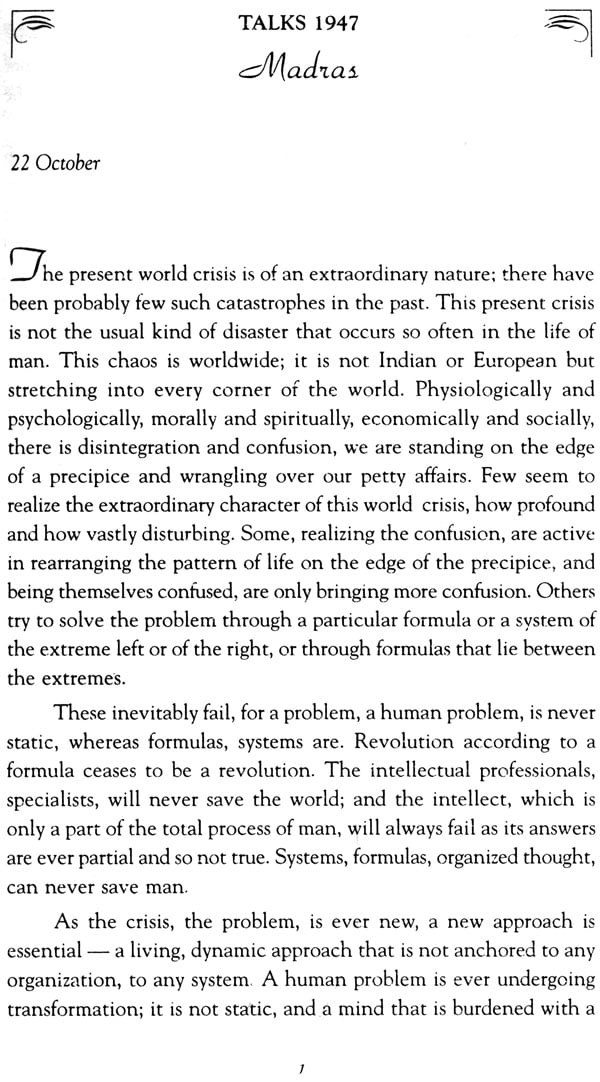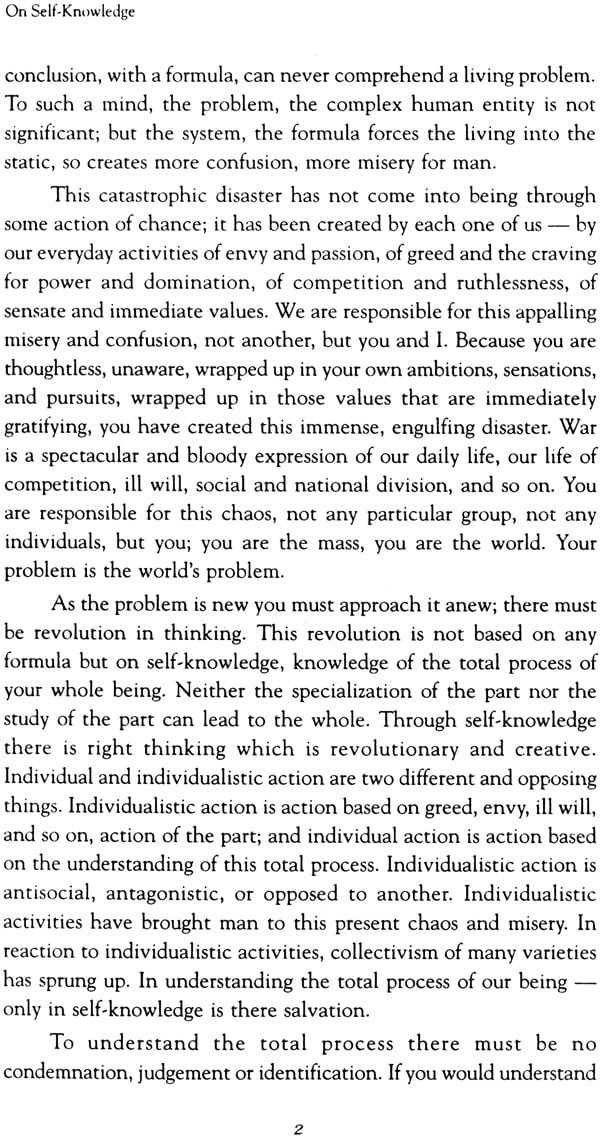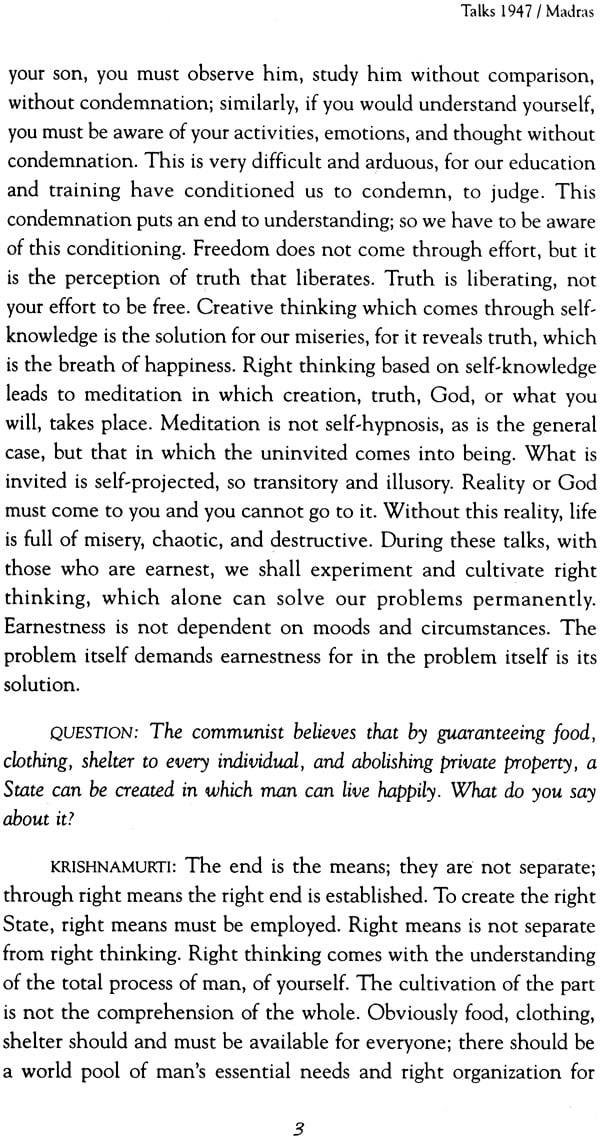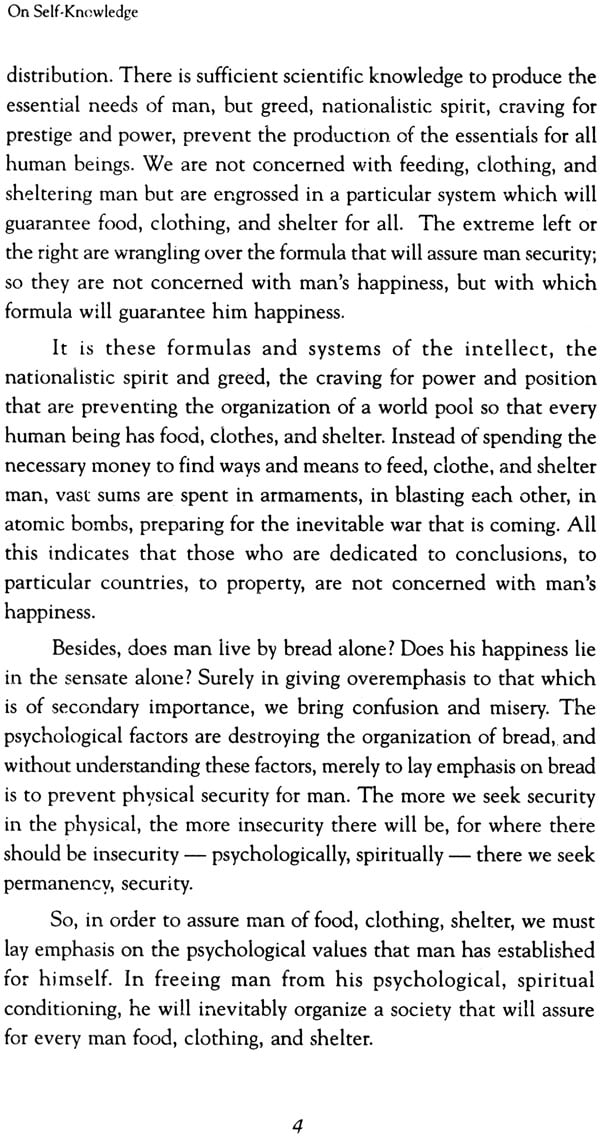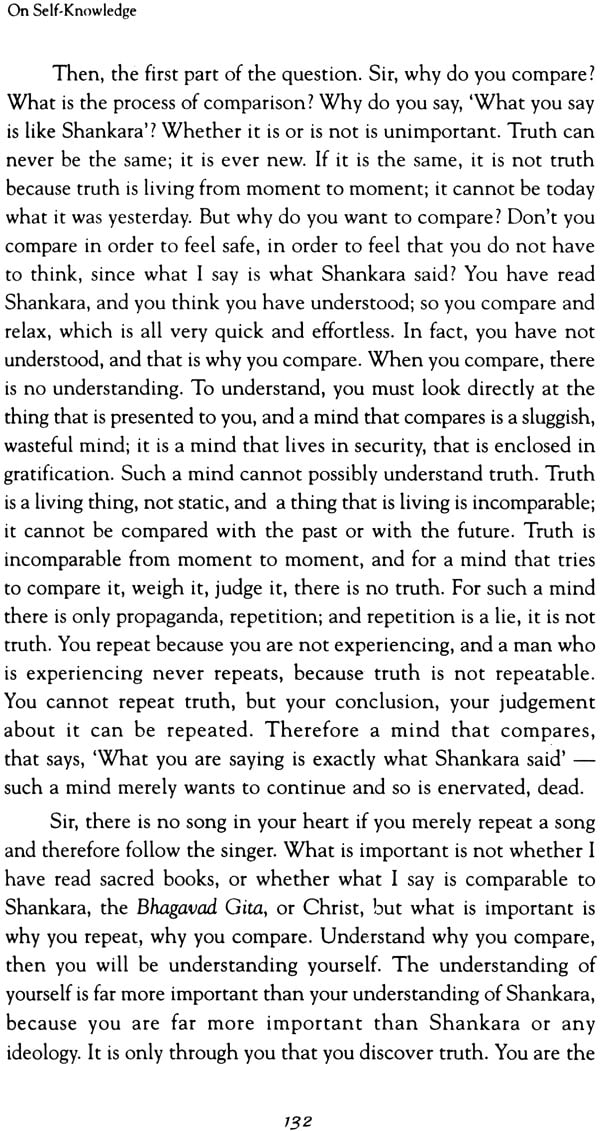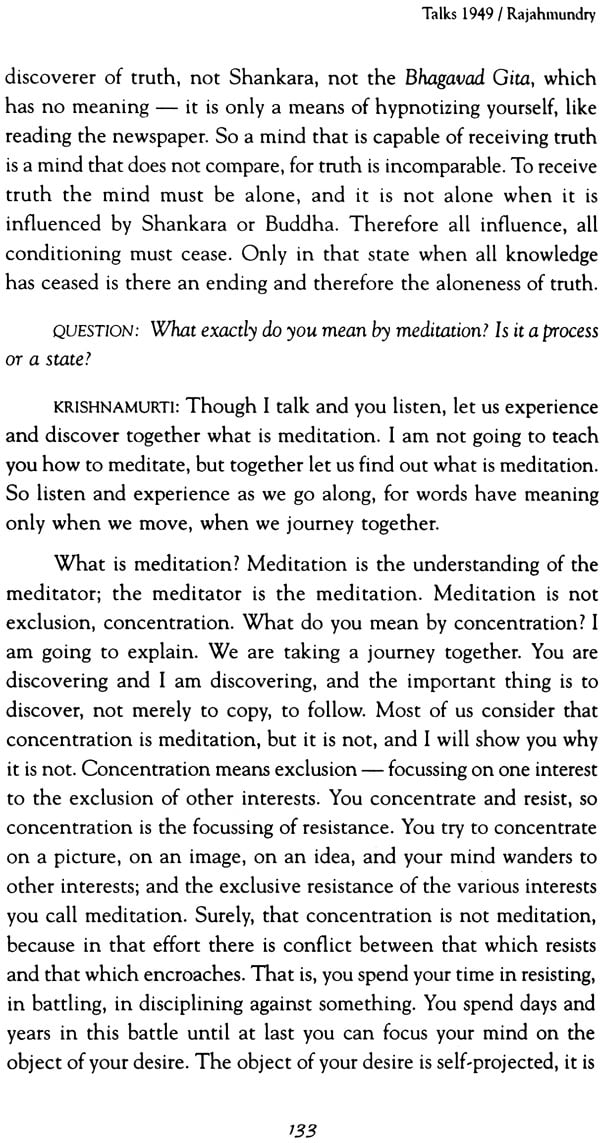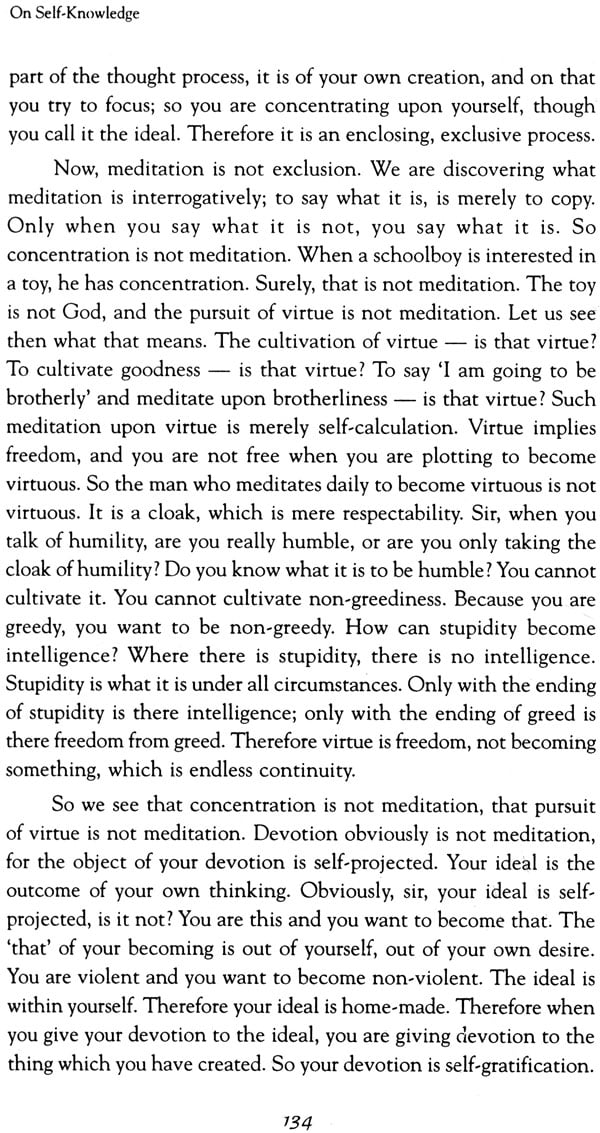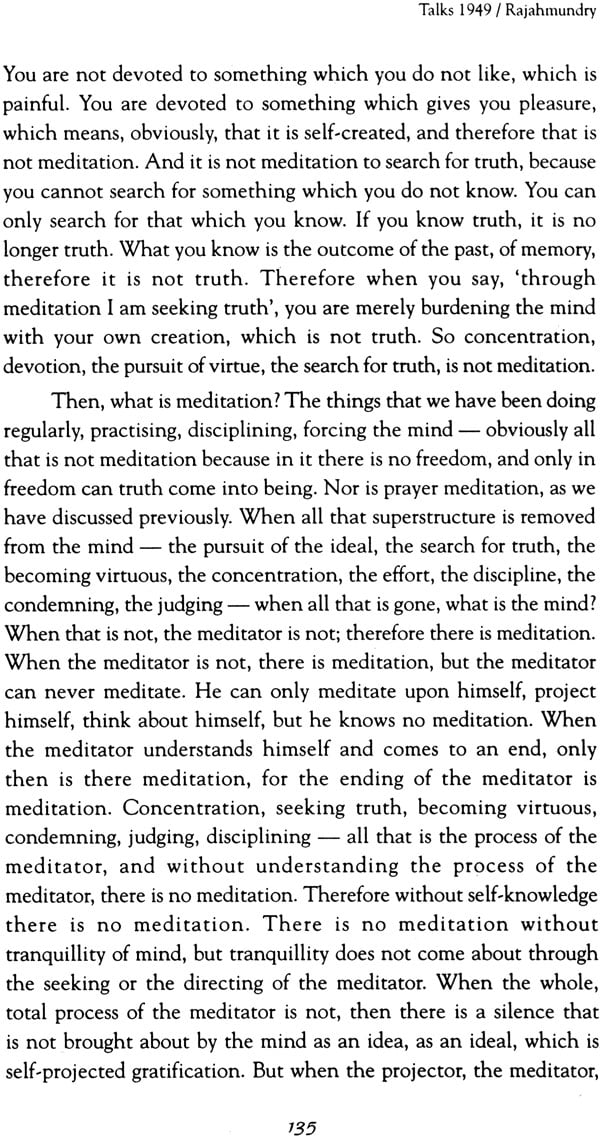
On Self Knowledge
Book Specification
| Item Code: | NAD664 |
| Author: | J.K.Krishnamurti |
| Publisher: | Krishnamuriti Foundation India |
| Language: | English |
| Edition: | 2010 |
| ISBN: | 8187326034 |
| Pages: | 136 |
| Cover: | Paperback |
| Other Details | 8.5 inch X 5.5 inch |
| Weight | 180 gm |
Book Description
On Self-Knowledge is the first volume in a series titled 'Selections from the Decades'. The series aims at presenting a representative sample of talks that Krishnamurti ga\T between the 1940s and the 1950s.
The book begins with the year 1947, a year that marked a milestone both in India's destiny and in the unfoldment of Krishnarnurti's teachings. The concerns of that period had, understandably, to do with the political and social problems of the day. What is striking about Krishnarnurti's approach, however, is that even while addressing contemporary issues, his answers are rooted in a timeless vision of life and truth. As such, he insists that regeneration in society can come about only through a radical revolution in the consciousness of the individual. And such a change, he avers, is possible only through self- knowledge.
The talks in this book reveal how Krishnamurti takes us, step by step, on the journey of discovering ourselves.
This book is one of a series titled 'Selections from the Decades'. The series aims at presenting a representative sample of public talks that Krishnamurti gave between the 1940s and the 1980s. Each volume focuses on the talks given during a decade or a part of it in different parts of the world. The series begins with Krishnamurti's talks in India in 1947, a year that marked a milestone both in India's destiny and in the unfoldment of Krishnamurti's teachings.
The intention behind putting together such a series is to give the reader an overview of how the teachings expressed themselves over a period of time and in a particular context and in a particular idiom. The series also shows how Krishnamurti responded to the different challenges posed by a rapidly changing society. Krishnamurti (1895-1986) lived through the most tumultuous part of a century that saw two world wars, the splitting of the atom, the breakdown of ideologies, the savage destruction of the earth and the degeneration of every aspect of human life. It was also a century that could claim phenomenal progress in various technological fields. Krishnamurti's prophetic vision warned us of coming events far ahead of time. Decades before we became aware of the peril to the planet, he was already exhorting children at school to take care of the earth, to tread lightly on it. By the 1970s he was to ask: 'What would happen to the human being when the computer takes over all the functions of the brain?'
Again we notice in the talks that the concerns expressed and the questions put to him in the 1980s were quite different from those of the 1940s and 1950s. What is striking about Krishnaruurti's approach, however, is that even while addressing the social, political and economic issues of the period, his answers are rooted in a timeless vision of life and truth. He shows how behind any problem lies the creator of the problem and how the source of fragmentation lies within the mind of man. He offers no readymade solutions to contemporary issues, for he sees clearly that they are but symptoms of a deeper malaise that lies embedded in the mind and heart of each human being.
Krishnamurti's statements are those of a seer, not of a social reformer. As such they are completely free of stereotype or cliche. Krishnamurti displays a remarkable resilience in adapting his approach and idiom to the state of the mind of the questioner so that his answers are always fresh and original. Each talk is a new experience for the audience or the reader as it takes one through an inward journey of self-discovery.
Questioned as to whether his teachings have changed over the decades, Krishnamurti was to say: 'No. There have been changes in expression, changes in vocabulary, changes in language and gesture - you know all that - but there has been no fundamental change from the beginning till now.' (Fire in the Mind p.16). Krishnamurti Foundation India feels happy to offer these series of powerful talks to its readers, many of whom might be coming upon them for the first time.
| Publisher’s Note | ||
| Talks 1947 | ||
| Madras | ||
| 22 October | Through self-knowledge there is right thinking which is revolutionary and creative | 1 |
| 2 November | The transformation, the regeneration must begin with you and not with another | 9 |
| 14 December | Happiness is not the denial of sorrow but the understanding of sorrow | 20 |
| Talks 1948 | ||
| Bombay | ||
| 7 March | In understanding the process of becoming, in which there is strife and pain, there is being, which is virtue | 30 |
| Bangalore | ||
| 25 July | You and I are the problem and not the world | 39 |
| Poona | ||
| 5 September | Ideas do not produce regeneration | 56 |
| 10 October | To understand oneself, one needs enormous pliability, and that pliability is denied when we specialize in devotion, in action, in knowledge | 69 |
| New Delhi | ||
| 14 November | Right action is that which comes out of the understanding of the whole content of ourselves, all that we are | 88 |
| Talks 1949 | ||
| Banaras | ||
| 20 February | Relationship is the mirror in which you discover yourself. | 100 |
| Rajahmundry | ||
| 4 December | Self-knowledge is not a religion, an ultimate end | 119 |
